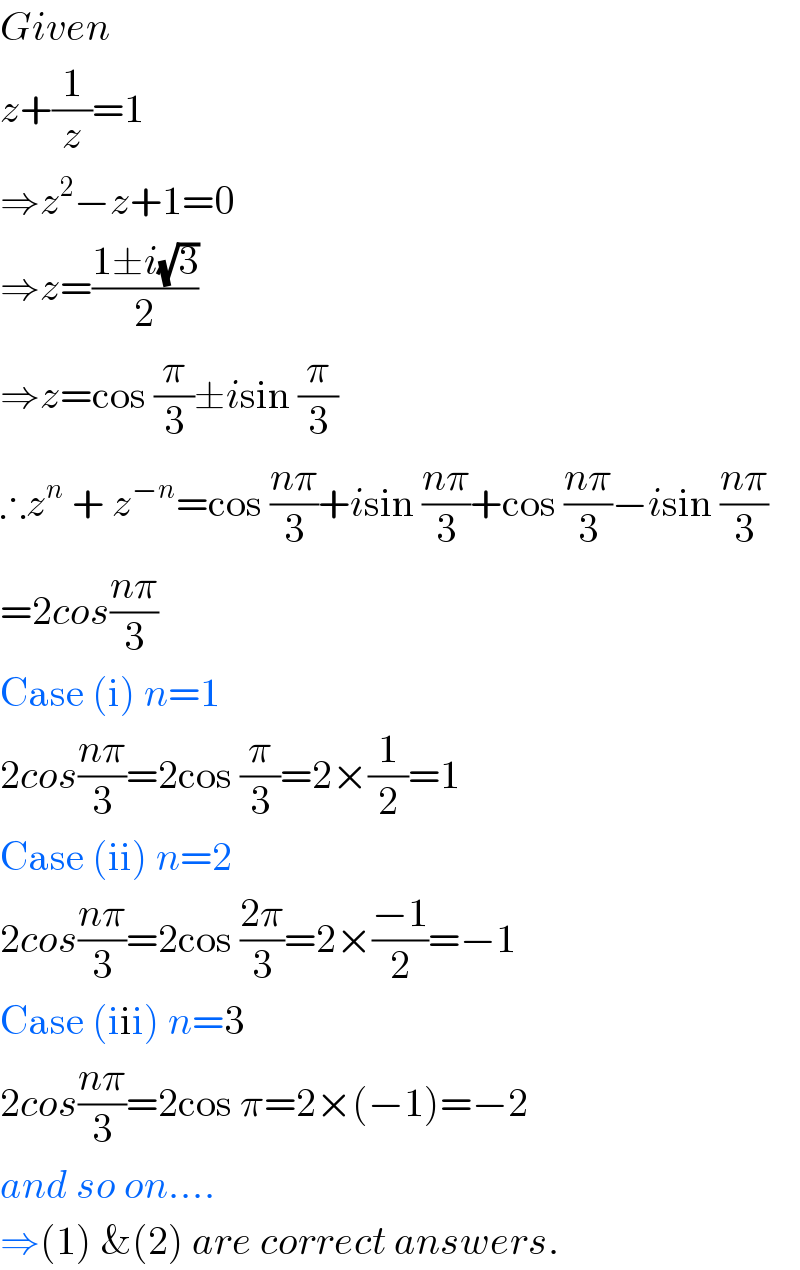
Question Number 20933 by Tinkutara last updated on 08/Sep/17

$$\mathrm{If}\:{z}\:\mathrm{is}\:\mathrm{a}\:\mathrm{complex}\:\mathrm{number}\:\mathrm{satisfying} \\ $$$${z}\:+\:{z}^{−\mathrm{1}} \:=\:\mathrm{1},\:\mathrm{then}\:{z}^{{n}} \:+\:{z}^{−{n}} ,\:{n}\:\in\:{N},\:\mathrm{has} \\ $$$$\mathrm{the}\:\mathrm{value} \\ $$$$\left(\mathrm{1}\right)\:\mathrm{2}\left(−\mathrm{1}\right)^{{n}} ,\:\mathrm{when}\:{n}\:\mathrm{is}\:\mathrm{a}\:\mathrm{multiple}\:\mathrm{of}\:\mathrm{3} \\ $$$$\left(\mathrm{2}\right)\:\left(−\mathrm{1}\right)^{{n}−\mathrm{1}} ,\:\mathrm{when}\:{n}\:\mathrm{is}\:\mathrm{not}\:\mathrm{a}\:\mathrm{multiple}\:\mathrm{of} \\ $$$$\mathrm{3} \\ $$$$\left(\mathrm{3}\right)\:\left(−\mathrm{1}\right)^{{n}+\mathrm{1}} ,\:\mathrm{when}\:{n}\:\mathrm{is}\:\mathrm{a}\:\mathrm{multiple}\:\mathrm{of}\:\mathrm{3} \\ $$$$\left(\mathrm{4}\right)\:\mathrm{0}\:\mathrm{when}\:{n}\:\mathrm{is}\:\mathrm{not}\:\mathrm{a}\:\mathrm{multiple}\:\mathrm{of}\:\mathrm{3} \\ $$
Answered by $@ty@m last updated on 09/Sep/17

$${Given} \\ $$$${z}+\frac{\mathrm{1}}{{z}}=\mathrm{1} \\ $$$$\Rightarrow{z}^{\mathrm{2}} −{z}+\mathrm{1}=\mathrm{0} \\ $$$$\Rightarrow{z}=\frac{\mathrm{1}\pm{i}\sqrt{\mathrm{3}}}{\mathrm{2}} \\ $$$$\Rightarrow{z}=\mathrm{cos}\:\frac{\pi}{\mathrm{3}}\pm{i}\mathrm{sin}\:\frac{\pi}{\mathrm{3}} \\ $$$$\therefore{z}^{{n}} \:+\:{z}^{−{n}} =\mathrm{cos}\:\frac{{n}\pi}{\mathrm{3}}+{i}\mathrm{sin}\:\frac{{n}\pi}{\mathrm{3}}+\mathrm{cos}\:\frac{{n}\pi}{\mathrm{3}}−{i}\mathrm{sin}\:\frac{{n}\pi}{\mathrm{3}} \\ $$$$=\mathrm{2}{cos}\frac{{n}\pi}{\mathrm{3}} \\ $$$$\mathrm{Case}\:\left(\mathrm{i}\right)\:{n}=\mathrm{1} \\ $$$$\mathrm{2}{cos}\frac{{n}\pi}{\mathrm{3}}=\mathrm{2cos}\:\frac{\pi}{\mathrm{3}}=\mathrm{2}×\frac{\mathrm{1}}{\mathrm{2}}=\mathrm{1} \\ $$$$\mathrm{Case}\:\left(\mathrm{ii}\right)\:{n}=\mathrm{2} \\ $$$$\mathrm{2}{cos}\frac{{n}\pi}{\mathrm{3}}=\mathrm{2cos}\:\frac{\mathrm{2}\pi}{\mathrm{3}}=\mathrm{2}×\frac{−\mathrm{1}}{\mathrm{2}}=−\mathrm{1} \\ $$$$\mathrm{Case}\:\left(\mathrm{iii}\right)\:{n}=\mathrm{3} \\ $$$$\mathrm{2}{cos}\frac{{n}\pi}{\mathrm{3}}=\mathrm{2cos}\:\pi=\mathrm{2}×\left(−\mathrm{1}\right)=−\mathrm{2} \\ $$$${and}\:{so}\:{on}.... \\ $$$$\Rightarrow\left(\mathrm{1}\right)\:\&\left(\mathrm{2}\right)\:{are}\:{correct}\:{answers}. \\ $$
Commented by Tinkutara last updated on 09/Sep/17

$$\mathrm{Thank}\:\mathrm{you}\:\mathrm{very}\:\mathrm{much}\:\mathrm{Sir}! \\ $$
